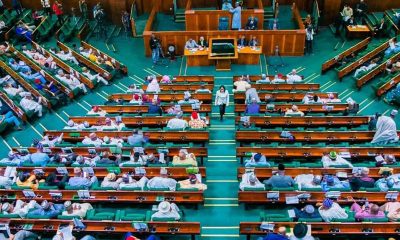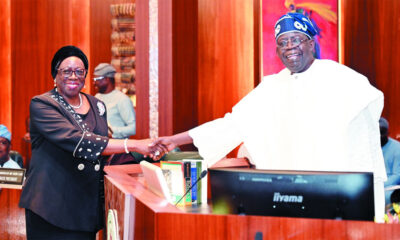News
Kekere-Ekun set to emerge Nigeria’s second female CJN

Kekere-Ekun set to emerge Nigeria’s second female CJN
Barring any last-minute change, Justice Kudirat Kekere-Ekun of the Supreme Court is set to emerge as the next chief justice of Nigeria (CJN).
If she assumes the office, Kekere-Ekun would become the second female justice in Nigeria to hold the exalted position after Mariam Aloma Mukhtar, who was CJN between July 2012 and November 2014, spending 28 months in office.
The current occupant of the office, Justice Olukayode Ariwoola, who assumed office on June 27, 2022, will formally bow out on Thursday, August 22, 2024, after attaining the mandatory retirement age of 70 years.
As the most senior justice of the Supreme Court after Ariwoola, Justice Kekere-Ekun is favoured to clinch the position.
The incoming CJN, who is 66 years old, may stay up to four years compared to the average of two years most of her predecessors held the position.
After 11 years at the Supreme Court, Justice Kekere-Ekun will not only become the next CJN but also head the National Judicial Council (NJC), which oversees the appointment, promotion, and discipline of judges across the country.
Justice Kekere-Ekun was born on May 7, 1958 and obtained her LL. B in 1980 from the University of Lagos and LL.M from the London School of Economics and Political Science in November 1983. She was called to the Nigerian Bar on 10th July, 1981.
From 1985 to 1989, she was in private practice and was later appointed a Senior Magistrate Grade II, Lagos State Judiciary in December 1989. She was appointed a judge of the High Court of Lagos State on July 19, 1996. She served as the chairman of the Robbery and Firearms Tribunal, Zone II, Ikeja, Lagos, from November 1996 to May 1999.
READ ALSO:
- Sheik Qomardeen highlights role of Tawheed in Islam at Riyad Saliheen Haflah
- No directive on N70,000 minimum wage for corps members — NYSC
- Ekiti NBA opens subsidised foodstuffs market
Kekere-Ekun was elevated to the Court of Appeal on 22nd September, 2004, where she served in various Divisions and as the presiding justice of two Divisions of the appellate court (Makurdi and Aku) in 2011 and 2012, respectively.
She was elevated to the Supreme Court of Nigeria as the fifth female justice of the apex court and sworn in on Monday, July 8, 2013.
She has attended numerous courses and seminars within and outside Nigeria and received several merit awards.
Justice Kekere-Ekun is also a life Bencher, a member of the International Association of Women Judges and its president.
LEADERSHIP Sunday reports that the judiciary has been in the eye of the storm, notably since the country returned to democratic rule in 1999.
With Justice Kekere-Ekun assuming office in the next few weeks, the succession battle in the Supreme Court may be rancour-free for the first time in five years.
Justice Walter Onnoghen, who served as CJN between 7th March, 2017 and 25th January 2019, left controversially after he was accused of failing to declare his assets.
His successor, Justice Tanko Muhammad, who assumed office on 25th January, 2019, followed almost the same pattern after his fellow justices accused him of unfair treatment, particularly in the area of their welfare. He voluntarily resigned on the grounds of ill-health on 27th June, 2022.
The CJN is the head of the government’s judicial arm. He presides over the country’s Supreme Court and the National Judicial Council.
The outgoing CJN (Ariwoola) was appointed acting CJN on 27th June, 2022 upon Justice Tanko Muhammad’s resignation and was confirmed by the Nigerian Senate on 21st September, 2022.
The Supreme Court of Nigeria is the highest, and its decisions are final. The president nominates the CJN upon the recommendation by the NJC, and is subject to confirmation by the Senate.
READ ALSO:
- FRSC, VIO under fire over prolonged delay in driving licence issuance
- Israeli strike killed nearly 100 in Gaza school refuge – Civil defence officials
- Israeli strike killed nearly 100 in Gaza school refuge – Civil defence officials
The CJN holds office at the pleasure of the Nigerian constitution and can only be removed from office due to death or on attainment of age 70, whichever comes first, or by impeachment by the Senate of the Federal Republic of Nigeria, which requires a super majority of the Senate members.
Short Stay In Office Based On Rules – Senior lawyers
In the last 15 years, seven CJNs have presided over the affairs of the nation’s judiciary, which is about an average of two years each for the occupants of that office.
Lawyers have, however, lamented the short stay in office of the CJNs.
According to them, an average of two years in office is not enough to bring about the needed reforms in the country’s judiciary.
However, some senior lawyers who spoke to LEADERSHIP Sunday were quick to assert that the CJN’s office is not a political appointment.
According to them, it is regulated by law.
A former attorney-general and commissioner for justice in Imo state, Chief Chukwuma-Machukwu Ume (SAN), said the apex court is not a political party whose programmes and policies are personal.
According to him, the CJN is an administrator and is not expected to bring his agenda to run the court.
“The court is regulated by law, and the law is the law; there is nothing you can do about it. The Supreme Court is not a political party where one man is expected to bring his agenda to the table after winning election,” he said.
Another lawyer, Barrister Abdul Balogun, said rules for succession to the CJN’s office have already been laid down.
“Laws and rules guide the judiciary, and any attempt to deviate from them is a call to lawlessness, which will negatively impact the country’s judiciary.
“In the judiciary as a whole, it is a laid down rule that the most senior assumes office upon a vacancy in the leadership of any court from the customary court to the Supreme Court. So, any attempt to deviate from that is a call for chaos in the system,” he said
In the last 15 years, the country has produced seven CJNs. While some of them left an indelible mark in office and in the minds of Nigerians with their policies and reforms to the country’s judiciary, others had their tenures characterised by controversies.
Kekere-Ekun set to emerge Nigeria’s second female CJN
News
NNPC CEO Ojulari Receives Prestigious Energy Institute Fellowship in London
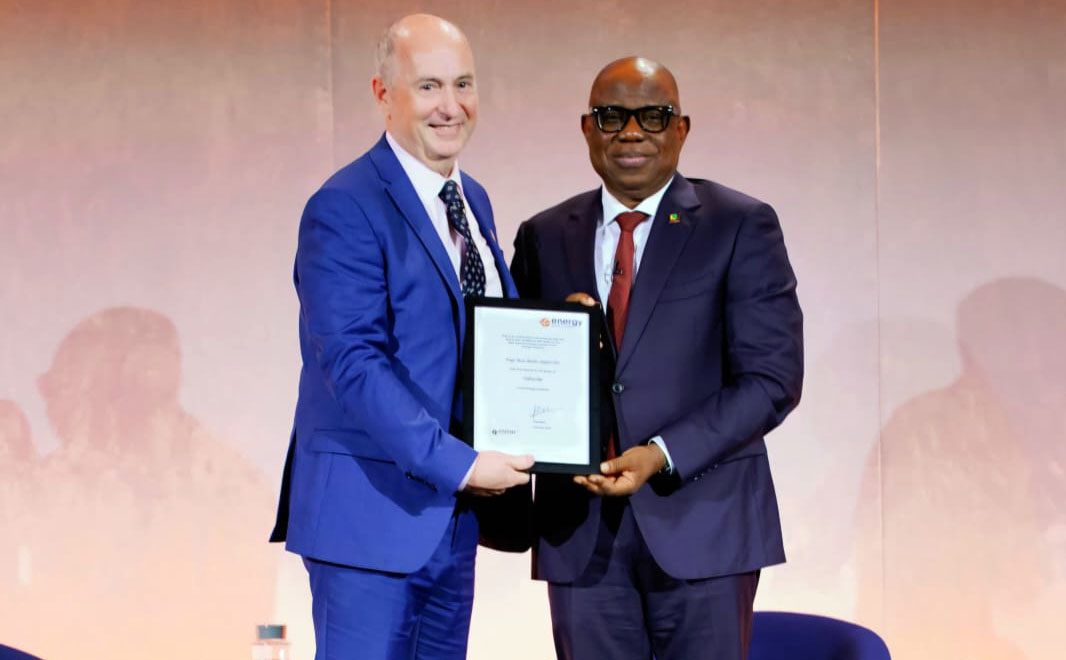
NNPC CEO Ojulari Receives Prestigious Energy Institute Fellowship in London
The Nigerian National Petroleum Company Limited (NNPC Ltd.) has earned international acclaim as its Group Chief Executive Officer, Engr. Bashir Bayo Ojulari, has been conferred with the Fellowship of the Energy Institute (FEI), United Kingdom — one of the highest honours in the global energy industry.
The Fellowship recognises senior energy leaders who have demonstrated sustained, high-impact contributions to the advancement of the energy sector. It was formally conferred on Ojulari during International Energy Week (IEW) in London, a leading platform for energy policy, finance, and industry leadership. (punchng.com)
The honour was presented by Andy Brown, President of the Energy Institute, who praised Ojulari’s transformative leadership of NNPC Ltd., highlighting his role in strengthening governance, embedding a performance-driven culture, and repositioning the company for long-term value creation.
Under his stewardship, NNPC Ltd. has implemented investor-focused reforms, enhanced operational excellence, and expanded strategic global partnerships, all contributing to increased confidence in Nigeria’s energy sector. The recognition reinforces NNPC’s ongoing transformation into a commercially driven, globally competitive, and transparent energy company.
READ ALSO:
- FCT Polls: CSO Situation Room Flags Late Voting, Vote Buying, Logistical Challenges
- ADC Defeats APC to Win First Polling Unit in FCT Area Council Election
- Trump Moves to Indefinitely Suspend Work Permits for Asylum Seekers
Significance for Nigeria and Africa
Experts note that the FEI Fellowship is not only a personal achievement for Ojulari but also a major institutional endorsement of NNPC Ltd.’s reform agenda. Being recognised at International Energy Week, which convenes policymakers, financiers, regulators, and industry leaders, positions the company at the centre of critical global energy discussions on sustainability, energy transition, and capital formation.
The award also signals growing international confidence in NNPC Ltd. and highlights Nigeria’s strategic role in Africa’s energy security and global energy transition ambitions. (vanguardngr.com)
Ojulari’s Leadership Achievements
Since assuming office, Engr. Ojulari has overseen multiple strategic reforms at NNPC Ltd., including:
- Driving governance and operational reforms to boost accountability.
- Expanding strategic partnerships and investor-focused initiatives.
- Enhancing execution efficiency across the company’s subsidiaries.
- Positioning NNPC Ltd. as a credible, investment-ready energy enterprise.
These efforts have not only improved the company’s profitability and performance but also strengthened Nigeria’s energy security and market competitiveness. (punchng.com)
Ojulari described the Fellowship as a reflection of collective effort within NNPC and reiterated his commitment to sustainable value creation, global best practices, and energy sector innovation.
NNPC CEO Ojulari Receives Prestigious Energy Institute Fellowship in London
News
FCT Polls: CSO Situation Room Flags Late Voting, Vote Buying, Logistical Challenges
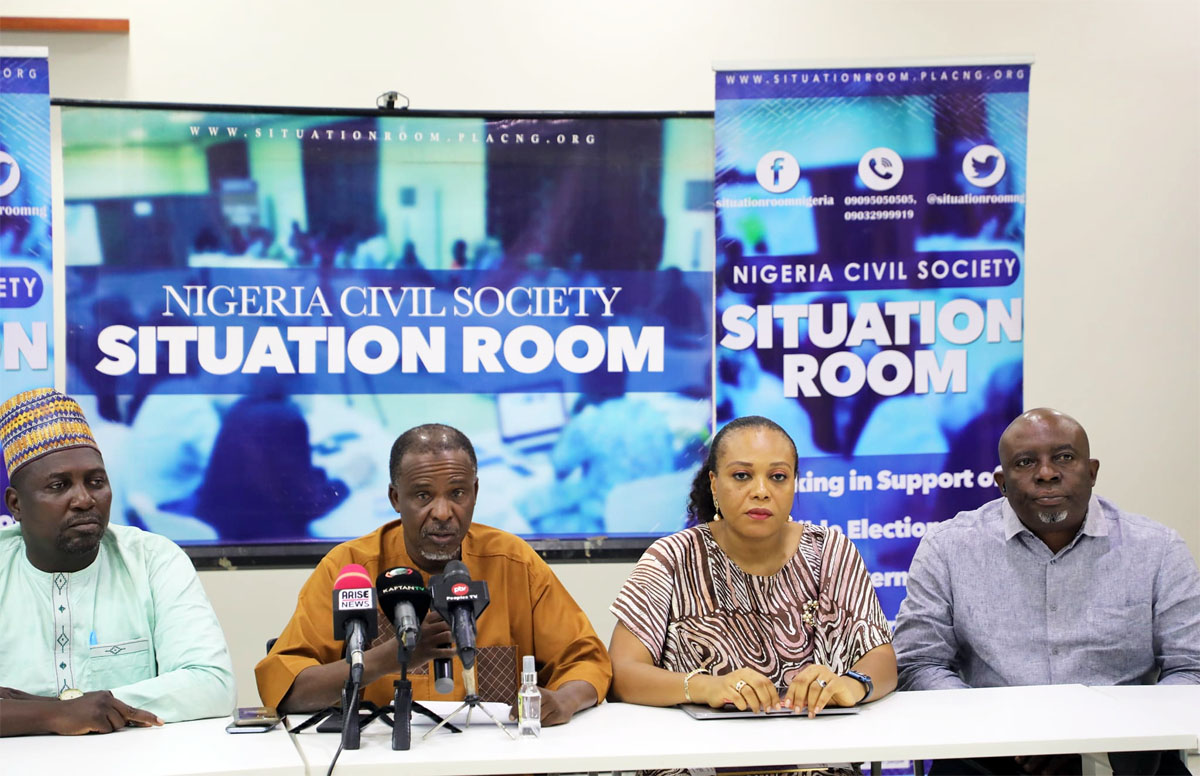
FCT Polls: CSO Situation Room Flags Late Voting, Vote Buying, Logistical Challenges
The Nigeria Civil Society Situation Room has raised concerns over multiple irregularities in the ongoing Federal Capital Territory (FCT) Area Council Elections, citing late polling unit openings, reports of vote buying, and logistical challenges that could affect voter participation.
According to the Situation Room, a coalition of over 70 civil society organisations advocating for credible elections in Nigeria, many polling units opened late, with an average start time of 9:15 a.m., well after the official 8:30 a.m. schedule. Observers also noted low voter turnout in several areas, particularly in AMAC, although queues began forming later in Kuje, Kwali, Gwagwalada, and Abaji Area Councils.
Vote Buying Observed
The coalition reported instances of vote buying, with voters allegedly offered up to ₦10,000 in exchange for ballots in units such as PU008, PU056, PU057, and PU058 in Gidan Mangoro Ward, AMAC. While some of the transactions were open, others were conducted discreetly.
The Situation Room warned that such electoral malpractice undermines the integrity of the election and called on electoral officials, political parties, and security agencies to intervene and prevent further incidents.
READ ALSO:
- ADC Defeats APC to Win First Polling Unit in FCT Area Council Election
- Trump Moves to Indefinitely Suspend Work Permits for Asylum Seekers
- Peller Escapes Generator Fire at Lagos Home, Recalls Earlier Lekki–Epe Scare
Logistical and Accessibility Issues
Observers noted that some voters struggled to locate their polling units after last-minute changes communicated by INEC via text messages. The Bimodal Voter Accreditation System (BVAS) generally performed efficiently, with a one-minute average accreditation time, though malfunctions were reported in a few units including Gwako Town Primary Schools II & IV and PU143, Gwagwalada.
The Situation Room also highlighted accessibility challenges for voters with disabilities, noting that braille ballot guides, magnifying glasses, and other assistive materials were largely absent, even in designated disability communities such as Karimajiji and PU052, Wuse.
Security and Election Conduct
Security personnel, including officers from the Nigeria Police, Civil Defence, Immigration Service, and Fire Service, were present in significant numbers and generally maintained order and professionalism.
Isolated incidents of intimidation and harassment were reported in locations such as Grade 1 Area Court, Rubochi (Kuje); Naharati Sabo School II, Rimba/Ebagi; and PU3, UNG Liman/UNGWAR LIMAN 1, Abaji Central, but security agents swiftly resolved these situations.
Call for Calm and Integrity
The Situation Room commended the INEC FCT Help Desk for promptly addressing reported issues and called on all stakeholders to maintain calm, resist vote buying, and ensure that the will of the people is respected as the polls continue and results are collated.
The report was jointly signed by Mma Odi and Celestine Odo, co-conveners of the coalition.
FCT Polls: CSO Situation Room Flags Late Voting, Vote Buying, Logistical Challenges
News
Trump Moves to Indefinitely Suspend Work Permits for Asylum Seekers

Trump Moves to Indefinitely Suspend Work Permits for Asylum Seekers
United States President, Donald Trump, has introduced a sweeping immigration proposal that could halt the issuance and renewal of work permits for asylum seekers for many years, marking what analysts describe as one of the most consequential shifts in U.S. asylum employment policy in decades.
The proposed rule, released on Friday by the U.S. Department of Homeland Security (DHS), seeks to suspend new employment authorisation for asylum applicants until the average processing time for designated asylum cases falls to 180 days or fewer.
According to DHS data, the asylum case backlog now exceeds 1.4 million applications, with the department projecting that meeting the 180-day benchmark could take between 14 and 173 years under current conditions—effectively creating an indefinite suspension of asylum work permits.
Despite the bleak projections, DHS said administrative restructuring, staffing increases, and efficiency-focused reforms could eventually reduce processing delays. However, officials acknowledged that significant improvements would take time.
READ ALSO:
- Peller Escapes Generator Fire at Lagos Home, Recalls Earlier Lekki–Epe Scare
- Abuja Church Expels Newly Married Woman Over Refusal to Consummate Marriage
- Pastor Sentenced to Death by Hanging for Murdering Landlord in Akwa Ibom
In a statement accompanying the proposal, DHS said the rule, if finalised, “would reduce incentives for frivolous, fraudulent, or otherwise meritless asylum claims.” The department stressed that work authorisation is not an entitlement, but a discretionary benefit granted by the DHS secretary.
If implemented, the policy would generally bar migrants who entered the United States unlawfully from receiving new work permits or renewing existing ones while their asylum claims remain pending.
Limited exemptions would apply only to individuals who alerted U.S. border officials within 48 hours of arrival that they feared persecution, torture, or faced another urgent humanitarian threat.
The proposal forms part of a broader immigration clampdown under President Trump, who returned to office in 2025 after campaigning on stricter border enforcement and tougher asylum standards.
Throughout his campaign and early months back in office, Trump portrayed immigrants and asylum seekers as economic and security burdens, claims that critics argue are not supported by crime or labour market data.
Immigrant advocacy groups, civil rights organisations, and some Democratic lawmakers have criticised the proposal, warning that denying work permits could push asylum seekers into poverty, increase dependence on charities, and drive people into undocumented employment.
Legal experts also expect significant court challenges, arguing that the rule could weaken long-standing U.S. and international asylum protections and undermine due-process guarantees.
The proposal will undergo a 60-day public comment period once it is formally published in the Federal Register on Monday. The regulatory process could extend for months or even years, with the final outcome uncertain amid anticipated legal battles.
Until then, existing regulations governing asylum seeker work permits in the United States remain in force.
Trump Moves to Indefinitely Suspend Work Permits for Asylum Seekers
-

 Politics2 days ago
Politics2 days agoPeter Obi Launches ‘Village Boys Movement’ to Rival Tinubu’s City Boys Ahead of 2027
-

 International3 days ago
International3 days agoCanada Opens New Express Entry Draw for Nigerian Workers, Others
-

 News2 days ago
News2 days agoPolice to Arrest TikToker Mirabel After She Recants False Rape Claim
-

 International2 days ago
International2 days agoEpstein, Ex-Israeli PM Named in Alleged Profiteering From Boko Haram Crisis
-

 Education12 hours ago
Education12 hours agoUTME: JAMB Clarifies Position on Hijab During Biometric Capture
-

 metro3 days ago
metro3 days agoOsun Awards 55.6km Iwo–Osogbo–Ibadan Road Project to Three Contractors
-
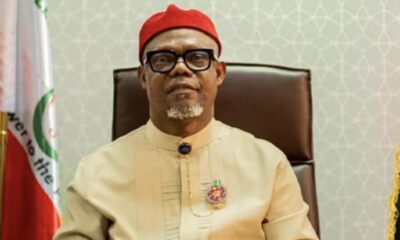
 Politics3 days ago
Politics3 days agoUpdated: Rivers Senator Mpigi Barinada dies at 64
-

 metro3 days ago
metro3 days agoOndo Monarch Killed as Bandits Strike Akure North





